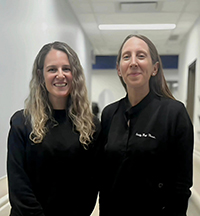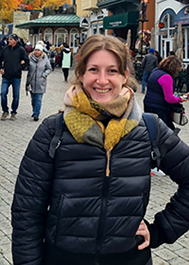
Breadcrumb
- News and Events
- News
- Content
- The Institute’s Clinical Observership Program: Bridging lab research and patient care
null The Institute’s Clinical Observership Program: Bridging lab research and patient care
Four postdoctoral trainees take part in a new initiative that deepens their understanding of the diseases they study by observing clinical practice alongside expert mentors
SOURCE: Research Institute of the McGill University Health Centre (The Institute)
June 9, 2025
The Research Institute of the McGill University Health Centre (The Institute) has launched a new Clinical Observership Program designed to bring research trainees closer to the clinical context of the biological systems they study. Through this immersive program, postdoctoral fellows follow physicians, meet with healthcare professionals, and interact with patients and families, gaining valuable insights into diagnosis, treatment, and the human impact of disease. This unique opportunity helps bridge the gap between biomedical discovery and patient care—fostering a more holistic understanding of health and illness that can ultimately enhance research relevance and impact.
The Clinical Observership Program was conceived by Rhian Touyz, MBBCh, PhD, Executive Director and Chief Scientific Officer of The Institute, and initiated by David Eidelman, MD, senior scientist at The Institute and former Dean of the Faculty of Medicine and Health Sciences at McGill University. The program reflects a deep commitment to training the next generation of scientists in translational, patient-informed research. In line with The Institute's 2030 Vision—precision health across the life course—this program promotes a culture of collaboration between basic and clinical researchers and encourages trainees to consider how their work might one day transform care.
This pilot edition of the Clinical Observership Program features four exceptional postdoctoral researchers, each paired with a clinical mentor whose expertise aligns with the trainee's field of study.

A postdoctoral researcher studying POLR3-related leukodystrophy—a rare, progressive white matter disease that affects children—Sabrina Alam uses mouse models to test potential therapies for a condition that currently has no cure. Her research focuses on understanding the disease at a molecular level and finding ways to slow or stop its progression. Through the Clinical Observership Program, she had the opportunity to see how these devastating conditions are diagnosed and managed in the clinic, under the mentorship of Dr. Geneviève Bernard.
"As someone working on preclinical therapies in the lab, this experience helped me connect my research to real patient care," says Sabrina Alam. "Seeing the emotional and social toll on families—especially parents—was deeply moving. It gave me a renewed sense of purpose and reminded me why this work matters. I'm grateful to Dr. Bernard for her invaluable guidance in shaping my perspective on patient-centered science."

Vanessa Hadid's postdoctoral research aims to predict cochlear implant (CI) outcomes by identifying neural, cognitive and clinical markers associated with speech perception and brain plasticity. Her clinical observership allowed her to observe key stages of the CI process at the MUHC Adult CI Program, including candidacy assessments, selection committee meetings, and device activation. Under the mentorship of Emily Kay-Rivest, MD, M.Sc., Vanessa's observership has enriched her understanding of patient experiences, highlighting how outcomes are influenced by medical history, emotional state, family support, anatomy, ear choice, and surgical outcomes.
"What struck me most was how differently patients experience the CI process," says Vanessa Hadid. "It pushed me to rethink my research tools to better capture the variables that may predict how the brain adapts to the implant and to reflect what truly matters for achieving better outcomes." She looks forward to continuing her observations during the rehabilitation phase.

Michelle Lan is studying how mechanical and biochemical cues in biomaterials influence stem cell behavior for intervertebral disc repair. She is developing bioadhesive patches designed to restore disc function after nucleotomy. Her time in the clinic and OR offered a new perspective on how patients cope with and respond to chronic lower back pain and spinal degeneration. Her clinical mentor is Dr. James Wu.
"Coming from an engineering background, it was a valuable opportunity to see the clinical side of things, says Michelle Lan. "It helped me connect the technical aspects of my research with real patient experiences."

Justine Mathé, PhD
As a fundamental scientist, Justine Mathé studies how bacteria interact with the lung environment in patients with cystic fibrosis, a genetic disease that leads to chronic lung infections and reduced lung function. Her research focuses on understanding host–pathogen dynamics to inform better treatment strategies. Through the Clinical Observership Program, she shadowed pediatric respirologist Larry Lands, MD, PhD, and gained new perspective on how her work in the lab connects to the clinical realities faced by patients and healthcare teams.
"This observership gave me a rare opportunity to see what cystic fibrosis looks like beyond the microscope," Justine Mathé says. "It helped me appreciate the complexity of care and the daily challenges faced by both patients and clinicians. It's been a powerful reminder of the human side of research—and why our work matters."
This new Clinical Observership initiative reflects The Institute's commitment to supporting exceptional scientists who are deeply informed by clinical realities. By enhancing the dialogue between laboratory and clinic, the program promotes closer collaboration between basic and clinical researchers—paving the way for more integrated, patient-centered research. It also exemplifies the unique advantage of having The Institute embedded within the hospitals of the McGill University Health Centre: a physical and intellectual proximity that fosters meaningful, day-to-day collaboration between researchers and clinicians working toward a common goal—improving human health.
Dr. Eidelman gratefully acknowledges the invaluable assistance of Jenny Koulis and the Pre-Awards team at The Institute, whose support helped bring this initiative to life. He also extends his thanks to Caroline White and her colleagues in the MUHC Education Directorate, whose guidance and collaboration made it possible to integrate the observerships within a clinical setting despite many competing priorities.